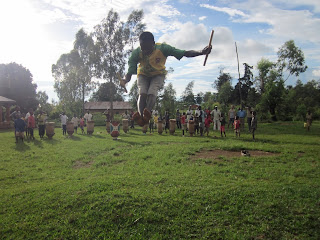His name was Richard Haryarimana. He is 7 months and lives on Colline (Hill) Gotele. I jump ahead in my narrative to tell you his story.
The clinic here does not get many emergencies at night, primarily because the only way of getting here is to walk. That walk at night is at least an hour, and generally much more, of an uphill trek in the dark, carrying a baby or child.
Richard had been hospitalized at another clinic for several days last week. We are not sure for what, but we think perhaps malaria. He was sent home on Thursday, but he was clearly still very ill when he was discharged. He continued to have significant diarrhea, and intermittent fever. His mother continued to breast-feed him, but his intake was limited, and we're not sure how much milk she was producing anyway. Because of his continued symptoms, she took him on Saturday to a traditional healer, who made multiple superficial cuts on his chest and neck, and sent him home on herbs.
Richard's diarrhea persisted, and he was obviously still very ill. The mother made the decision last night to come to the clinic, and made the uphill two hour journey, partially in the dark, last night. She arrived at about 7 P.M., and we were alerted immediately. There was myself, Dr. Melino, and two nurses, including Brad, who went to to see him.
What I saw was shocking. The baby was severely dehydrated, having lost 15-20% of his normal bodily fluid. (Severe dehydration would be 15%, and this baby was at least that). His skin was dry and cold. When you pinched the skin on his abdomen, it formed a tent, and did not return to normal for several seconds.
This was a baby who would die very quickly if he did not have fluid. However, when a little baby like that is so dehydrated, the veins collapse, and there is no I.V. access. Many attempts were made to get an I.V. into the baby, but without success. Melino, in a desperate attempt to get fluid into him, put in what is called an intra-osseous needle: he put a needle through the top part of the tibia directly into the bone. We poured fluid into the baby as quickly as we could.
But the diarrhea was not his only problem. He had a cough, but, more important, his breathing was very labored: fast, and his abdomen was caving in and out with each breath. It was clear that he had pneumonia, and we gave him a dose of intramuscular Ceftriaxone. Multiple attempts were made to insert an I.V, probably as many as fifty, done by nurses as expert in this task as any nurses anywhere in the world. Those attempts were unsuccessful, but the fluid continued to be given through the tibia. The baby's color ultimately improved, his dehydration corrected, and, as proof of that, he urinated twice. He was stabilized.
I wish I could report that it was all good news. It is not. The child's fluid status is corrected, and he is now getting oral rehydration. However, his neurological status, even today, continues to be very worrisome. He remains extremely irritable, and is not really responsive. His breathing is better, but not completely. The concern is that he either has meningitis, or, because of the severe dehydration, a stroke due to insufficient blood flow to the brain. The potential meningitis, we are treating with antibiotics. If it turns out to be a stroke, there will be nothing to do. We will see how things progress, day by day.
The story is an amazing one, but primarily, at least for me, because of the skill and the dedication and the tenacity and the fortitude that Melino and the nurses showed in the face of overwhelming odds against saving that child. We worked on that child for five hours, until almost midnight. Yes, I was there, and, yes, I made certain suggestions that were helpful. However, I say this not with false modesty, but I know who the real heroes were last night: Melino and the nurses. There are too many people who are presumed to be heroes or given the status of heroes in today's world. Trust me, if you had been there last night, you would seen first-hand what real heroes do. Melino would never have left that child's side for a second until he considered the child to be stable. Any thoughts of food or rest would not and did not enter his mind during that entire ordeal. Simply put, he would not let that child die, and his efforts, at least for another day, have proved successful.
What was equally amazing last night was the reaction of the mother during the entire five hour process. That reaction was the Burundian way: she sat in a hard chair, no more than a foot from the action, expressionless, unmoving, not saying a word, not making a sound, and only responding to the occasional question put to her by Melino. She asked nothing, she said nothing, but, as I said, that is the Burundian way.
So that was last night. I would not mind if tonight was a little more peaceful. There is still much to tell about the last three days, but this story seemed too important not to tell now.
Signing off from Burundi, Peter
































